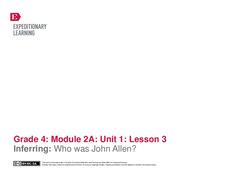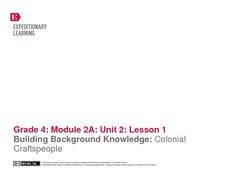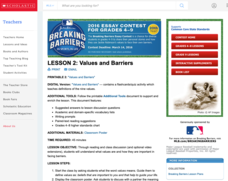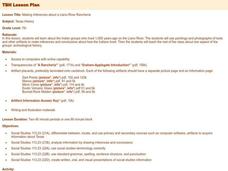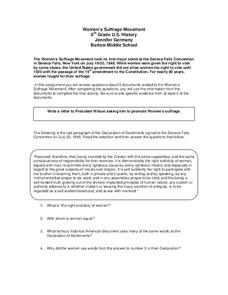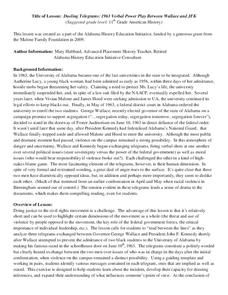EngageNY
Mid-Unit 2 Assessment: Inferring About the Silversmith Trade in Colonial Times
The seventh lesson plan in this unit on colonial trade assesses fourth graders' ability to use details from an informational text to make inferences and create a piece of informative writing. The included assessment begins with learners...
EngageNY
End of Unit 1 Assessment: Inferring and Synthesizing (From Two Texts) About Life in Colonial America
Close your colonial America unit with a performance-based assessment. Class members will show their proficiency in several skills including using details to back up inferences, determining the meaning of words in context,...
EngageNY
Taking Notes Using a Graphic Organizer: Inferring About Work and Play in Colonial America
What was life like in colonial America? Follow this lesson and your pupils will find out what people in colonial times did for work and for fun. Ask learners to compare and contrast the two texts and explain what the reading helped them...
EngageNY
Taking Notes Using a Graphic Organizer: Inferring About the Importance of Religion in Colonial America
Improve class understanding of colonial times by reading an informational text and filling out the accompanying graphic organizer. Class members work with a partner to read, take notes, make inferences, and synthesize information.The...
EngageNY
Inferring: Who was John Allen?
Help your learners work with difficult or archaic words. A continuation of lesson two of this module, the plan here focuses on deciphering the Inventory of John Allen, in particular the unfamiliar words that make up much of the list. Add...
EngageNY
Building Background Knowledge: Colonial Craftspeople
In the first lesson plan of this unit on colonial trade, fourth graders gain background knowledge of different jobs performed by early colonists. The class begins with a slide show presentation that includes a variety of great...
Scholastic
Lesson 2: Values and Barriers
Scholars investigate and discuss the importance of values and how they can be used to break barriers. Small groups work collaboratively to examine the text and draw inferences to answer questions. A writing assignment challenges pupils...
Curated OER
What Can We Learn From the Past?
What would future archeologists learn from your scholars' personal belongings? Have them bring in a box of "primary sources" from their home. Discuss the difference between observations and inference, using some of your own items to...
Curated OER
Call It a Hunch
Give young scholars a chance to practice making inferences after reading the book Through My Eyes by Ruby Bridges. They confirm whether or not their conclusions are true, have a class discussion, and then independently complete an...
Channel Islands Film
Cache: Lesson Plan 3 - Grades 4-5
Should the excavation of what is believed to be the cave of the Lone Woman of San Nicholas Island be allowed to continue? As a practice exercise designed to prepare pupils for a timed writing exam, individuals read two Los Angeles...
EngageNY
Reading and Taking Notes on Colonial Trades
In the tenth instructional activity of this unit, young scholars learn to categorize information as they continue researching their colonial trade. During guided practice, the teacher models how to read informational text slowly while...
Curated OER
Express Yourself Lesson Seed 2
Use Langston Hughes's poem, "Words Like Freedom," to explore the concepts of freedom and liberty. Learners read the poem, determine the theme, and use the provided graphic organizer to examine the connotative and denotative meanings of...
Curated OER
Making Inferences about a Llano River Rancheria
Seventh graders study the Indian groups who lived 1,000 years ago on the Llano River. They use paintings and photographs of tools and other artifacts to make inferences and conclusions about how the Indians lived.
Curated OER
Let Your Motto Be Resistance: African American Portraits: Grades 3-5
Students explore the contributions of African Americans of the 20th century. In this African American history lesson, students examine portraits of Muhammad Ali, Romare Bearden, Lorraine Hansberry, Judith Jamison, and Leontyne Price in...
All for KIDZ
Building Relationships: The Orphan of Ellis Island
Family and friendship are two very important themes of the historical fiction novel The Orphan of Ellis Island by Elvira Woodruff. From video clips and writing prompts to reader's theater and family interviews, this resource...
EngageNY
Launching Readers Theater Groups: Identifying Passages from Esperanza Rising for Readers Theater that Connect to the UDHR
Teach young readers how to compare two texts and select passages that exemplify a specific theme with Lesson 6 from Unit 3. Begin by modeling how an expert reader selects examples from a text, performing a think aloud on how Article 2 of...
Curated OER
Women’s Suffrage Movement
Though the movement for Women's Suffrage stretched over several decades and across two centuries, the final few years were the most difficult hurdle in many ways. Use a document-based question writing exercise to make inferences about...
Curated OER
Project 1
Students are given a coin to observe and make inferences about. Using a worksheet, they make two columns to list their observations and inferences in an organized manner. They develop a hypothesis based on one of the inferences and...
Curated OER
Texas State Capitol, Post-Visit Lesson Plan, 7th Grade
Seventh graders tour the Texas State Capitol and discover two historic paintings in the Capitol building. They discover how these paintings depict crucial events of the
Texas Revolution. In groups, they review notebooks of the artist...
EngageNY
Close Reading: Unpacking Specific Articles of the UDHR
Lesson 6 of this extensive unit finally has your class begin to work their way through specific articles from the text of the Universal Declaration of Human Rights (UDHR). Before examining the rights actually detailed in the...
Curated OER
Memories to Last: Observing Monuments
Students use scientific observation and inference to examine the Hazen Brigade Monument. In this observation lesson, students review the reasons for building monuments in society. Students then recall monuments they have seen and...
Alabama Department of Archives and History
Dueling Telegrams: 1963 Verbal Power Play Between Wallace and JFK
Information, inferences, and innuendos. Text and subtext. Class members examine telegrams exchanged between President John F. Kennedy and Alabama Governor George Wallace, studying both what is stated and what is implied by the...
Curated OER
The Diary of Anne Frank
Eighth graders read the Diary of Anne Frank. In this novel reading instructional activity, 8th graders read and analyze the story. Students do online activities and create a newspaper giving a summary of three major events in the story....
EngageNY
Contrasting Perspectives: Should the Farmworkers in Esperanza Rising Go On Strike? (Chapter 12: "Los Esparragos/Asparagus")
Explore multiple perspectives through a jigsaw activity that will improve your pupils' understanding of the characters in Esperanza Rising as well as their understanding of strikes and human rights. Tapping into prior knowledge, and...




